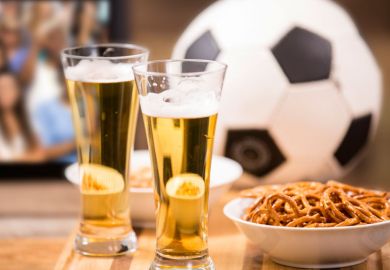Do we poor misguided academics drink too much? I am sure many of us could do with drinking less, but I was surprised to see The Guardian’s Academics Anonymous complaining that Russell Group universities ply everyone with too much alcohol.
In my experience – as a scientist, so I cannot comment on whether other disciplines do the same – there is actually rather less alcohol available in the course of a working day than used to be the case. This is probably just a question of age, since the writer (describing themselves as both PhD student and staff) is almost certainly considerably younger than me.
Many years ago, I remember reading a J. B. Priestley novel and being struck by just how much the protagonists drank, any time after about 11am. Instead of sitting down with a cup of coffee for a discussion, beer seemed to be the chosen fluid to consume. Of course, pubs didn’t serve much in the way of coffee until relatively recently, and Costa and Starbucks were decades away when Priestley wrote. But, for men at least (goodness knows what women drank on such occasions: Babycham? port and lemon? or perhaps simply lemonade), beer was drunk almost as if one was worried the water was undrinkable. By 1930 – the time he wrote Angel Pavement, which was, I think, the book I was reading – this was unlikely to have been the case. I don’t think I know anyone who would toss off a pint of beer or two for elevenses now.
So much for pre-war drinking habits away from academia. Perhaps Dorothy Sayers’ Gaudy Night gives us a glimpse into the academic customs of the 1930s, but since it is focused around a women’s college where drink was barely more than a medicinal sip, it isn’t particularly informative. I think it is clear that a female senior common room consumed a lot less than Priestley’s cast of characters.
When I set out as a young researcher what I do recall clearly, though, is the lunchtime tipple. When I went to the Massachusetts Institute of Technology to give my very first research seminar, I was offered a drink over the lunch before I spoke. I had no hesitation in saying “no”, but the professors I was with were willing to crack open a bottle. If I had been male, I wonder how much offence I might have caused by declining, but certainly as a young woman it didn’t seem to raise eyebrows.
Once I moved to Cambridge and the Cavendish Laboratory, a group of us – usually chauffeured to the village pub by Sir Sam Edwards – would take the seminar speaker out for lunch before the seminar itself. The group collectively tended to drink beer, but I always stuck with orange juice. Again I could get away with this as a woman, but I suspect people would have looked askance at the male lecturer who opted out. This was in the early 1980s, and in the decades since then it is clear that drinking at lunch has become very much the exception not the rule. I have watched a steady decrease in take-up of beer or anything else. Even if, at a formal lunch for a visiting dignitary, wine is provided, very few academics take it up. Drink at lunchtime and a clear head to think in the afternoon just don’t mix. Sparkling water is a much better bet.
So why does the Anonymous Academic think we drink too much? I suspect it is because of the inducement that some departments offer to get students to turn up to talks. My own departmental seminar, designed for the whole department, not just subfield specific, is (just in the past year or two) followed up with a reception where wine is on offer. As is juice and food! No one requires the students to guzzle large quantities of cheap Chardonnay but, if its availability acts to encourage them to tear themselves away from their own focused research and listen to something from a wider field, then it is thought to be a good thing. I don’t believe it is provided to bolster the courage of the young so that they dare to approach the visiting professor, I believe it is there to act as an almost literal lubricant to encourage social cohesion in the department.
The Cavendish Laboratory is a huge enterprise, with about 60 to 70 PhD students starting each year. They come from all parts of the world and carry out research in wildly different topics. Spread across a number of buildings, they may never see each other unless they come to such departmental events. Gone are the days when we all congregated in the canteen at narrowly set times for tea and coffee. That habit too served effectively to permit casual interactions. By now most groups run to their own Nespresso machine – or at least a kettle – thereby keeping research groups to themselves. So, the small inducement of tepid alcohol, plus the excitement of a sausage roll or a slice of green pepper and dip seems a small price to pay to facilitate knowledge exchange and social integration. If you are from a remote part of the globe, it may be encouraging to find that there are others who are likewise suffering from culture shock. For minorities of all kinds, knowing that you are not alone can be valuable in confidence-building.
So I for one am not going to knock the availability – and that is all it is, certainly not a compulsion – of a little alcohol at the end of the day. It has to be at the end of the day, of course, or students might be prone to breach health and safety regulations by “driving” delicate machinery after consumption. I haven’t spotted much peer pressure if a student (or staff member) opts for the soft drink option. This is certainly far preferable to the availability of beer at lunchtime, let alone elevenses, and might just bring about some fertile new collaboration or at least some broadening of horizons.
Athene Donald is professor of experimental physics at the University of Cambridge and master of Churchill College, Cambridge. This article originally appeared on her blog.
Register to continue
Why register?
- Registration is free and only takes a moment
- Once registered, you can read 3 articles a month
- Sign up for our newsletter
Subscribe
Or subscribe for unlimited access to:
- Unlimited access to news, views, insights & reviews
- Digital editions
- Digital access to THE’s university and college rankings analysis
Already registered or a current subscriber?





